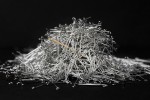Saturday Morning Science 006
Life is What You Make It-2.0 Usually this column gets constructed out of items which are “trending” and usually they cluster around a given discipline or problem that makes for interesting connections. This week we’re looking at current items about biology. There is no overarching “big theme” or theory. Biology is much like its subject matter; diffusive and continually coming up with novelty and variety.
3 D Organ Printing– The “Gee Wiz” knob on this one is hard cranked to eleven. Is it any surprise that I’m going to link you to a TED lecture? It’s easy to be cynical. If the world is as full of great ideas as the TED series suggests, where’s my flying car? It’s hard not to get uneasy with the secular evangelism that marks the series’ overall style. This time however it’s the real deal. Dr. Anthony Atala of the Wake Forest University School of Medicine in Winston-Salem, North Carolina has been working for two decades on techniques for literally building new, transplantable organs. His method involves constructing a scaffold of biomaterial and then spraying on cells using 3D printing technology. I surrendered when his presentation cut to the shots of the modified ink jet printer working on a replaceable heart. Maybe you’re made of tougher stuff and you’ll hold out until the shots of the artificial heart valve or maybe the wound filling device. But I don’t think anybody can withhold their approval after the section where we’re introduced to one of Dr. Atala’s patients, a young man who received an engineered kidney ten years ago. The video runs just slightly over 17 mins. and is linked here http://www.ted.com/talks/anthony_atala_printing_a_human_kidney. Dr. Atala gave a previous TED lecture two years ago; Anthony Atala on Growing Organs. This one lacks some of the now standard TED style hooks, repeats some of the same material and is more technical but it gives a better overview of the work involved, the time scale, the difficulties and the ethics of their experiments.
D Organ Printing– The “Gee Wiz” knob on this one is hard cranked to eleven. Is it any surprise that I’m going to link you to a TED lecture? It’s easy to be cynical. If the world is as full of great ideas as the TED series suggests, where’s my flying car? It’s hard not to get uneasy with the secular evangelism that marks the series’ overall style. This time however it’s the real deal. Dr. Anthony Atala of the Wake Forest University School of Medicine in Winston-Salem, North Carolina has been working for two decades on techniques for literally building new, transplantable organs. His method involves constructing a scaffold of biomaterial and then spraying on cells using 3D printing technology. I surrendered when his presentation cut to the shots of the modified ink jet printer working on a replaceable heart. Maybe you’re made of tougher stuff and you’ll hold out until the shots of the artificial heart valve or maybe the wound filling device. But I don’t think anybody can withhold their approval after the section where we’re introduced to one of Dr. Atala’s patients, a young man who received an engineered kidney ten years ago. The video runs just slightly over 17 mins. and is linked here http://www.ted.com/talks/anthony_atala_printing_a_human_kidney. Dr. Atala gave a previous TED lecture two years ago; Anthony Atala on Growing Organs. This one lacks some of the now standard TED style hooks, repeats some of the same material and is more technical but it gives a better overview of the work involved, the time scale, the difficulties and the ethics of their experiments.
 Beef without Grief – Using techniques similar to Dr. Atala’s, Medical University of South Carolina’s Dr. Vladimir Mironov has proposed a concept that’s worth doing just for the amount of side flack it would generate; cultured meat. Grown in bioreactors called carneries this product would be meat without all of the attendant higher structures (ie. big brown eyes in the case of cows, insufferable cuteness in lambs or irritatingly human qualities in pigs) that form much of the ethical argument for vegetarianism. Gone also would be the land use argument as well. Other than some brief funding from NASA, this project isn’t attracting any American federal funding. Where is the brave venture capitalist that’s going to kick start this one? Check out this Reuters article. Enjoy.
Beef without Grief – Using techniques similar to Dr. Atala’s, Medical University of South Carolina’s Dr. Vladimir Mironov has proposed a concept that’s worth doing just for the amount of side flack it would generate; cultured meat. Grown in bioreactors called carneries this product would be meat without all of the attendant higher structures (ie. big brown eyes in the case of cows, insufferable cuteness in lambs or irritatingly human qualities in pigs) that form much of the ethical argument for vegetarianism. Gone also would be the land use argument as well. Other than some brief funding from NASA, this project isn’t attracting any American federal funding. Where is the brave venture capitalist that’s going to kick start this one? Check out this Reuters article. Enjoy.




